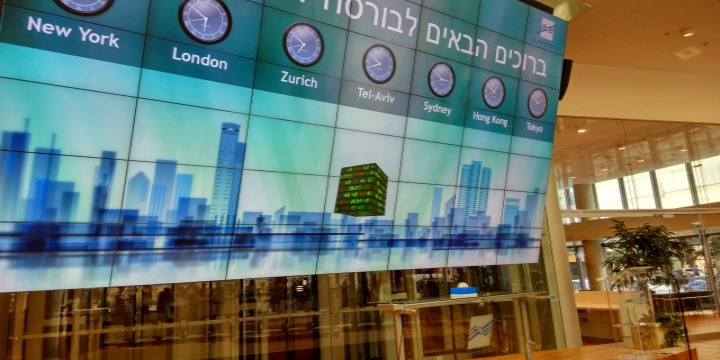The lobby of Tel Aviv’s stock exchange. Photo: Wikimedia Commons.
October 7, 2023, marked a turning point. Israel’s deterrence doctrine fractured in full view, exposing the limits of even the most advanced security systems. But within weeks, another reality emerged. The response was swift, coordinated, and tech-enabled. Intelligence, cyber capabilities, and precision operations operated in sync. The message was unmistakable: Israel’s innovation infrastructure works under pressure.
This credibility matters, not only for defense — but for diplomacy. In a region where conventional alliances are fragile and shared interests are often transactional, innovation has become a stable common ground. Countries across the Middle East are turning to technology to solve challenges that transcend borders, such as water scarcity, food security, energy efficiency, and health system resilience. Israel, despite geopolitical complexity, is positioned as a reliable source of operational solutions.
Across the region, Israeli technology is already embedded in transformation efforts. Fintech pilots in Bahrain, health tech systems in Morocco, and climate-tech deployments across the GCC countries are proving that technological collaboration can outpace political tension. These systems are already in production, shaped by practical needs and delivered by teams that know how to move quickly. Innovation diplomacy doesn’t rely on treaties; it relies on execution and offers regional players a tangible benefit from collaboration. This is what stability through technology can look like.
The global competition around AI has introduced a new kind of strategic map. Nations are no longer measured only by military assets or resource reserves, but by their ability to develop, deploy, and manage AI infrastructure. Compute power now determines who can build foundational models, launch autonomous systems, and influence the frameworks that govern global technology.
Israel has something few countries in the region can claim: the capacity to make meaningful contributions to this landscape. With over 7,000 active tech companies and more than 430 multinational R&D centers, Israel brings depth and maturity to emerging technology domains. Its startup engine operates on a global scale, supported by a talent base shaped by elite military units, top-tier academic institutions, and a proven track record of commercial execution.
While regional players are investing heavily to build capacity, Israel is already delivering. Although it may not house hyper-scale data centers, it generates the intellectual property, core algorithms, and system architectures that make those centers useful. This embedded value gives Israel strategic leverage in the AI economy without having to own the infrastructure outright.
GCC nations are rapidly transitioning from extraction-based economies toward digital infrastructure, including cloud computing, AI, and digital healthcare systems. This creates an opportunity for regional cooperation grounded in shared goals. Israel brings technical maturity and a track record of delivery, while Gulf states bring capital and scale. Together, they can co-develop platforms that support regional resilience, spanning public health, agriculture and energy. This is a future that is already unfolding. The Abraham Accords opened a channel for cooperation, and the demand for pragmatic, tech-first partnerships is accelerating it.
At Startup Nation Central, we connect global stakeholders to Israel’s innovation ecosystem. And we have seen the result of these efforts: trust builds when solutions are delivered consistently and visibly. This is a moment of strategic realignment across the region. Political dynamics are evolving, and economic priorities are shifting toward sustainability, productivity, and technological independence. Israel can be a central partner in this transition. But leadership will depend on investment, coordination, and focus.
The Middle East is being reshaped — and the region’s future will belong to those who build platforms, deploy solutions, and deliver value. Israel has the tools to help lead this transformation, and the region is ready. The moment is now.
Yariv Becher is the vice president of partnerships at Startup Nation Central and a former commercial attaché representing Israel’s Ministry of Economy, helping Israeli technology companies access foreign markets.
The post Innovation Over Instability: How Israel Can Use Its Economy to Anchor a New Middle East first appeared on Algemeiner.com.
Click this link for the original source of this article.
Author: Yariv Becher
This content is courtesy of, and owned and copyrighted by, https://www.algemeiner.com and its author. This content is made available by use of the public RSS feed offered by the host site and is used for educational purposes only. If you are the author or represent the host site and would like this content removed now and in the future, please contact USSANews.com using the email address in the Contact page found in the website menu.








